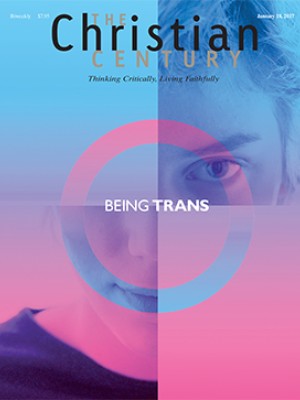All of us are beautiful
Our identities—gender and otherwise—are shaped by community and God.
When George Bush Sr. was campaigning for president, he made a stop at a North Carolina nursing home. When he came upon an elderly gentleman bent over in his wheelchair, Bush leaned over to ask, “Sir, do you know who I am?” The man looked up and responded, “No, but if you go to the nurses station, they can tell you.” I have no idea if the president-to-be followed up on the man’s suggestion and, if he did, what identity some nurse assigned him. But the story opens the door to remembering the many ways in which all of us search for identity during the course of our lives.
Identity quests are not reserved for the lost, the odd, and the weak. All we have to recall is Dietrich Bonhoeffer, who in his own centered and faith-filled life wrestled with identity questions, expressed in his poem, “Who Am I?”
For some people, identity questions revolve around appearance, social acceptance, or vocational discernment. For others, it’s economic status or the anxieties accompanying relationships. For still others, questions of gender identity loom large.
Read our latest issue or browse back issues.
If you aren’t acquainted with any transgender people, I think you’ll find the stories in this issue of the Century enlightening. Transgender identity is one of many issues that we at the Century believe are too important to leave in the realm of ignorance or misperception. In covering this often overlooked population, we are not aiming to offer a version of a narrow identity politics that ends up perpetuating a group’s marginalization.
In thinking about interpretive handholds for reflecting on gender identity, I’d begin with the recognition that gender is exceedingly complex. When it comes to the mind and spirit working within the particulars of a human body, the rich mysteries of God are deeper than anyone can fathom. Gender spectrum cases will continue to make news. (See stories of South African Olympic track star Caster Semenya for an example of the complexity.)
My second claim would be that there is a dignity about existence itself. To be created by God is to know that we are beautiful and important and that we are charged to help each other live the capacities God has planted in us. As the psalmist reminds us, we are “fearfully and wonderfully made . . . intricately woven in the depths of the earth.” That would be all of us.
My third claim would be that part of Christian responsibility is to give voice to those whose voices haven’t been heard or are easily ignored. Though only a small percentage of adults in the United States are transgender (0.6 percent in a Williams Institute study), their perspectives matter.
Finally, for Christians, discussions of individual gender identity need to include but go beyond personal rights to acknowledge that we are formed by others, shaped by community, and secured within the hand of God. When people approached John the Baptist one day to inquire, “Who are you?” John could only answer by speaking of being in relation to Jesus. Our task is to live our gendered lives in such a way that those lives would not make sense if the Lord did not exist.
A version of this article appears in the January 18 print edition under the title “Identity search.”







